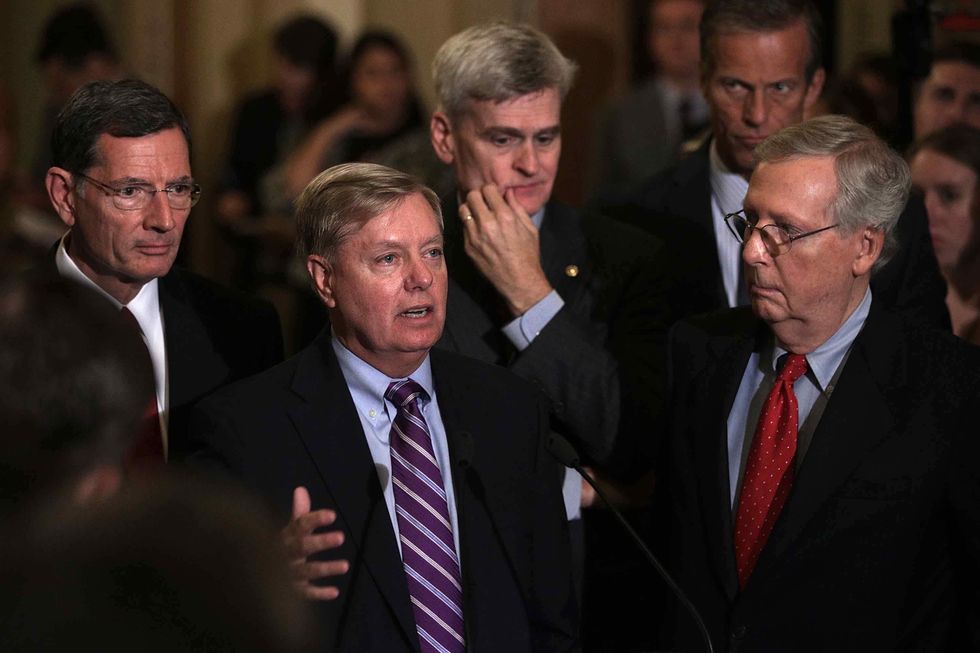
Sen. Lindsey Graham (R-S.C.) is leading the latest effort to "repeal and replace" Obamacare before Sept. 30. (Alex Wong/Getty Images)

There is not a single Republican in the Senate who was elected on a platform of keeping Obamacare in place, but if at least 50 Republicans don’t agree to vote in favor of the recent proposal offered by GOP Sens. Lindsey Graham (S.C.), Bill Cassidy (La.), Dean Heller (Nev.) and Ron Johnson (Wis.), that’s exactly what’s going to happen.
The Graham-Cassidy-Heller-Johnson bill would roll back the Affordable Care Act’s Medicaid expansion program and block grant Medicaid and Obamacare subsidy funds to the states, whose lawmakers would then be empowered to decide for themselves how best to use the money to help their communities.
The legislation would also repeal the individual and employer mandates and medical device tax, eliminate the federal essential health benefits mandates, and keep in place the federal pre-existing conditions requirement, although states would be allowed to permit insurance companies to charge more money to people with health conditions applying for coverage.
The bill is far from perfect, as Sen. Rand Paul (R-Ky.) argued in a recent interview: “This isn’t a repeal. This is keeping Obamacare and redistributing the proceeds. So, this is not a repeal bill, this is sort of, ‘Hey, we’ll take Obamacare, replace it with Obamacare, but we’re going to let the states have a little more power in how we spend it.”
Paul is correct that the overarching goal of Obamacare — making as many Americans as possible reliant on the federal government, in one form or another — remains in place, but after several months of negotiating, it’s clear this is the best deal possible given the current political composition of the Senate.
In previous negotiations, conservatives had little reason to sign on to bills that would have required most of Obamacare to stay in place throughout the country, including the failing exchanges, and moderate Republicans felt uncomfortable ending Medicaid expansion. The reason this bill has a real chance of being passed is because it avoids the numerous pitfalls of past negotiations by shifting much of the decision-making to the states, where it should have always been, in accordance with the 10th Amendment.
If Republicans in Congress were truly willing to live up to the many promises they have made over the past seven years, they would repeal Obamacare and replace all of it with a free-market system that relies on long-established, classical liberal principles. Further, they would get the federal government out of the health care marketplace and allow states to pass their own policies and approve their own health care-related taxes. However, as they have proven repeatedly, they aren’t willing to do that, and this is the best possible agreement that has a legitimate chance of becoming law, especially considering Congress only has until Sept. 30 to pass legislation using the budget reconciliation process, which allows bills to be passed in the Senate without needing 60 votes to end a filibuster.
If Congress fails to pass the Graham-Cassidy-Heller-Johnson bill, the results could prove to be disastrous for the cause of liberty. The Obamacare exchanges are collapsing. The Centers for Medicare and Medicaid Services’ latest projection shows the number of counties expected to have only one health insurance carrier in the Obamacare exchanges in 2018 is 1,472, an astounding 47 percent of all counties. Compared to 2015, that’s a 683 percent increase in the number of counties with only one insurer.
If the Obamacare exchange death spiral continues, Congress will be forced to replace the Affordable Care Act with a different model, and congressional Democrats, led by socialist Sen. Bernie Sanders (I-Vt.), have already started to discuss the possibility of a Medicare-for-all health care system, which they are hoping to pass as soon as they have the power they need in Washington, D.C. If Republicans can’t repeal or fix the current model, a health care crisis could soon develop that would give Democrats the opportunity they need to ram through radical, socialistic policies.
The Graham-Cassidy-Heller-Johnson plan is the best way to avoid that fate, but not all hope would be lost if they fall short. The Affordable Care Act allows for states to apply to the Trump administration for waivers to temporarily improve their ObamaCare and Medicaid systems, and Department of Health and Human Services Secretary Tom Price has already encouraged lawmakers to do just that. With the help of the Trump administration, states could take control of their own destiny and prevent their health insurance markets from descending into chaos.
Justin Haskins